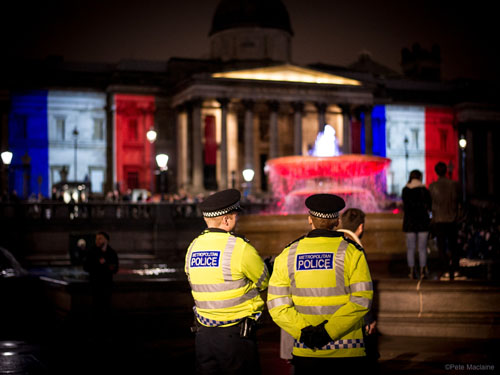
Metropolitan Police at Paris Attack Candlelit Vigil. London. © Pete Maclaine.
I’m a Photographer, Not a Terrorist (PHNAT) is seriously concerned by reports that Police Scotland intends to “seize phones if officers are filmed whilst on duty”, according to the Daily Record.
PHNAT is worried by the apparent conflation of the lawful act of recording police officers with an unrelated offence of obstruction, which can be committed whether using a cameraphone or not.
The tone of reporting, saying officers have “been told to look out for members of the public trying to video them”, and thrust of the apparent briefing, suggests the statement by Police Scotland was designed to discourage lawful activity – potentially misleading both the public and officers themselves as to the law.
The article quoted a spokeswoman saying: “Officers are aware members of the public may film them in the course of their duties. Such action is not a criminal offence unless it causes an obstruction to the officer carrying out their professional duties.
“Any individual causing an obstruction will be warned about their behaviour. If such actions persist, they face being arrested and their equipment being seized.”
The statement is accurate to a point. It is true that anybody can film officers and that doing so is not an offence, while obstructing police can be an offence regardless of how it is done. Filming while deliberately blocking an officer, for example, could be illegal. Refusing to stop recording from a safe distance is not.
In the context of the threat to “seize phones if officers are filmed” there is a draconian implication that, where their work is not impeded, simply filming officers could be treated as obstruction in itself. The threat of confiscation of equipment further conflates these two separate matters in a dangerous way.
It is clear in legislation and guidance that filming police, even if asked to stop, does not ordinarily constitute obstruction or any offence. If Police Scotland do not wish to give the misleading suggestion that this is illegal or feel their position has been misstated, PHNAT would strongly urge them to clarify their comments and the law – both to the public and to their own force.
This view reportedly taken by Police Scotland could confuse officers and discourage lawful and sometimes important actions by the public for fear of police retaliation.
Many people PHNAT speaks to have encountered police with little grasp of the law around recording in public places. Officers often state inaccurate legal positions that could not possibly have come from within their force’s official training and guidance. This suggests externally reported positions and misreported powers can often have influence on the ground.
The right to record police is integral to holding the state to account, covering public interest news and preserving our visual history.
To paraphrase the Metropolitan Police Federation’s position, British officers are not the “secret police”. Policing by consent requires them to act in the glare of the public eye, not behind a veil of legal threats against the public they aim to protect.
Welcome to one party state Scotland. Police Scotland frequently give the impression of being out of control and answerable to no-one. Unfortunately there is no political will to rein them in. That said, anything in the Daily Record should be treated with caution. I would have more confidence in the content of the article if it wasn’t based on a slanted version of something allegedly said by a “spokeswoman”. Niven Rennie is one of the more sensible senior officers and I would like to know exactly what he said rather than an edited version.
LikeLike